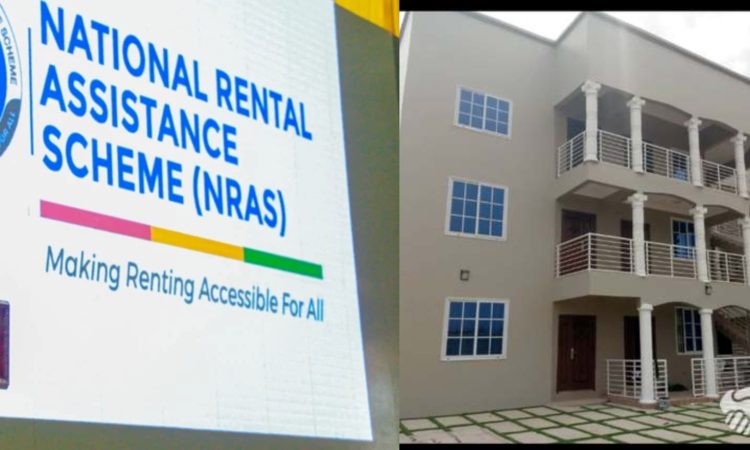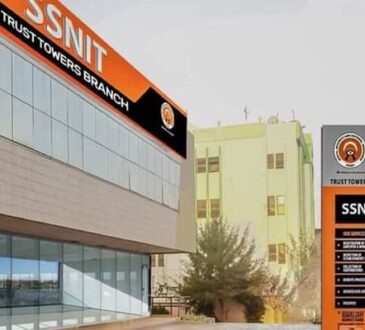Why 2 years rental advance payment in Ghana? The National Rent Assistance Scheme to Cure the ordeal

The burden of accommodation rental in Ghana, and especially, in the cosmopolitan centers is a topic that needs no further embellishment. The realities of the socio-economic climate, predicts sufficiently, the challenges, which the overwhelming majority of the people are confronted with when it comes to renting of accommodation in the Metropolitan, Municipal and District Assembly areas of our society. But particularly, challenging, is the rent debilitating syndrome in the cosmopolitan centers. The challenge itself, could be categorized into the following sub-headings:
Availability of Accommodations
In many instances, residents in the cosmopolitan areas especially, Accra, Kumasi, Tema, Takoradi, Cape Coast etc. are seriously confronted with this challenge, where demand outweighs supply in those jurisdictions. It suffices, that the rural-urban drift, adversely affects the convenience with which such provisions could be made to meet the demand ratio.
Insufficient Financial Resources / Economic Deprivation of the People in the Demand Bracket
The story about economic stress, insufficient income generation opportunities for the low to middle income earners in the country has an expressive outlay on the people’s purchasing power inclusive of their abilities to meet other daily bills like rent, food, clothing etc. – which are all fundamental needs to human survival. In Ghana, the cliche` goes, that the people do not make a living income, and yet strive hard to survive on their meagre means of living. The overwhelming ramification is brought to bear on the population bracket’s ability to readily own or rent a piece of property for use as their homes.
Rental Advance Collection Practice
The elephant chunk of the challenge under purview is the notorious practice of Advance Payment collection under the accommodation rental practice in Ghana, where the affected population bracket is compelled to make a 2 to 3-year advance payment before one could secure a piece of property or apartment for a home. To compound this particular challenge is also, the fact, that many of these low to middle income earners themselves do not have ready access to credit facilities because of stringent measures operated by the financial institutions in one’s bid to acquiring these facilities within the crucial time of the bulk demand of such financial quantum before one could secure a property for a home after say, been posted to duty-either as a teacher, nurse, civil servant or even a private entrepreneur, just trying to settle in such geographical jurisdictions of advantage to the start of their business ideas and operations. In fact, this challenge is real and practical and in need of immediate and realistic redress.
Accessibility and Middlemen Role (Agents)
The factor of inaccessibility is sometimes, created because of this very development of the middlemen role, popularly known in our terrain as ‘Agents’. Many of such middlemen have unscrupulously exploited, frustrated and complicated the citizenry’s quest to obtaining accommodation for their settlement and their families. Under the practice, these Agents are themselves entitled to a self-determined charge of 10% of the total cost of the rental charge, collected in advance payment over a period of not less than two years-usually. Many such prospective tenants have on many occasions fallen prey to these so-called Agents, wherefore, the latter have usually, succeeded in absconding the entire sweat-earned accommodation rental fees of their purported clients without necessarily securing them any place of residence; this development is especially prevalent in the Metropolis – Accra, Kumasi, Tema etc.
Public Policy prudence, requires accountability, civic virtue and public acceptability. It portends therefore, that the rental laws, Regulations of the Rent Control Department, government’s social intervention policies, stakeholder engagement proposals and many other relevant policy documents have not pushed the interests of the woefully affected populace radically, enough in the face of these outlined adversities. It is in this light, that the Rent Act (Act 220) and the Ghana Housing Authority Bill has been given a critical review by the Sector Minister of the Ministry for Works and Housing in the person of Hon. Francis Asenso-Boakye in conjunction with the relevant stakeholders to addressing the pernicious cycle of the accommodation and rental challenges, that has strangulated the populace over the span of time.
The introduction of the National Rent Assistance Scheme is such a great policy offering a sigh of relief to the overwhelming majority of the affected population bracket of this canker. “There is the urgent need for government to offer protection to low-income and vulnerable prospective tenants from abuse and arbitrary actions of landlords and offer incentives to stimulate private sector investment”, remarked, the Sector Minister-during a colloquium to review the existing Rent Act (Act 220) and the Ghana Housing Authority Bill, organized jointly by the Ministry of Works and Housing and the Kwame Nkrumah University of Science and Technology (KNUST) at Kumasi in July, 2022.
The National Rent Assistance Scheme itself, is a policy direction, that effectively and radically, seeks to eradicate the notorious practice of Accommodation Rent Advance Payment, and open the system up for easy access to consumer credit facility to massage the accommodation needs of the masses. The policy is also, is purposeful in its wholistic implementation in that it invites investment opportunities and investors in general into the real estate and housing infrastructural provision and development agenda. It targets the legal elements, regulations and control mechanism in the supply chain market index.
SuCasa Properties – a formidable real estate developer, and a relevant stakeholder in the Affordable Housing infrastructural provision agenda of the country, finds the legal architecture and the social policy element of the National Rent Assistance Scheme-such a relevant catalyst to the protection, promotion and preservation of its own complimentary Affordable Housing Projects to cushion the efforts of the government.
If the government’s Affordable Housing policies are anything to be attained, then the legal frameworks underpinning our housing infrastructural provisions and accommodation rental schemes must be reinvigorated and given the full force of the law for realistic implementation and the realization of its desired aftermath effects.
Public-Private Partnership is such a laudable initiative, that must be given the blessings, unflinching commitment, and the political will in its integrated development initiative.
By Daniel Kofi Awuku-Asare (PRO, SuCasa Properties Ltd. www.sucasapropertiesgh.com)







